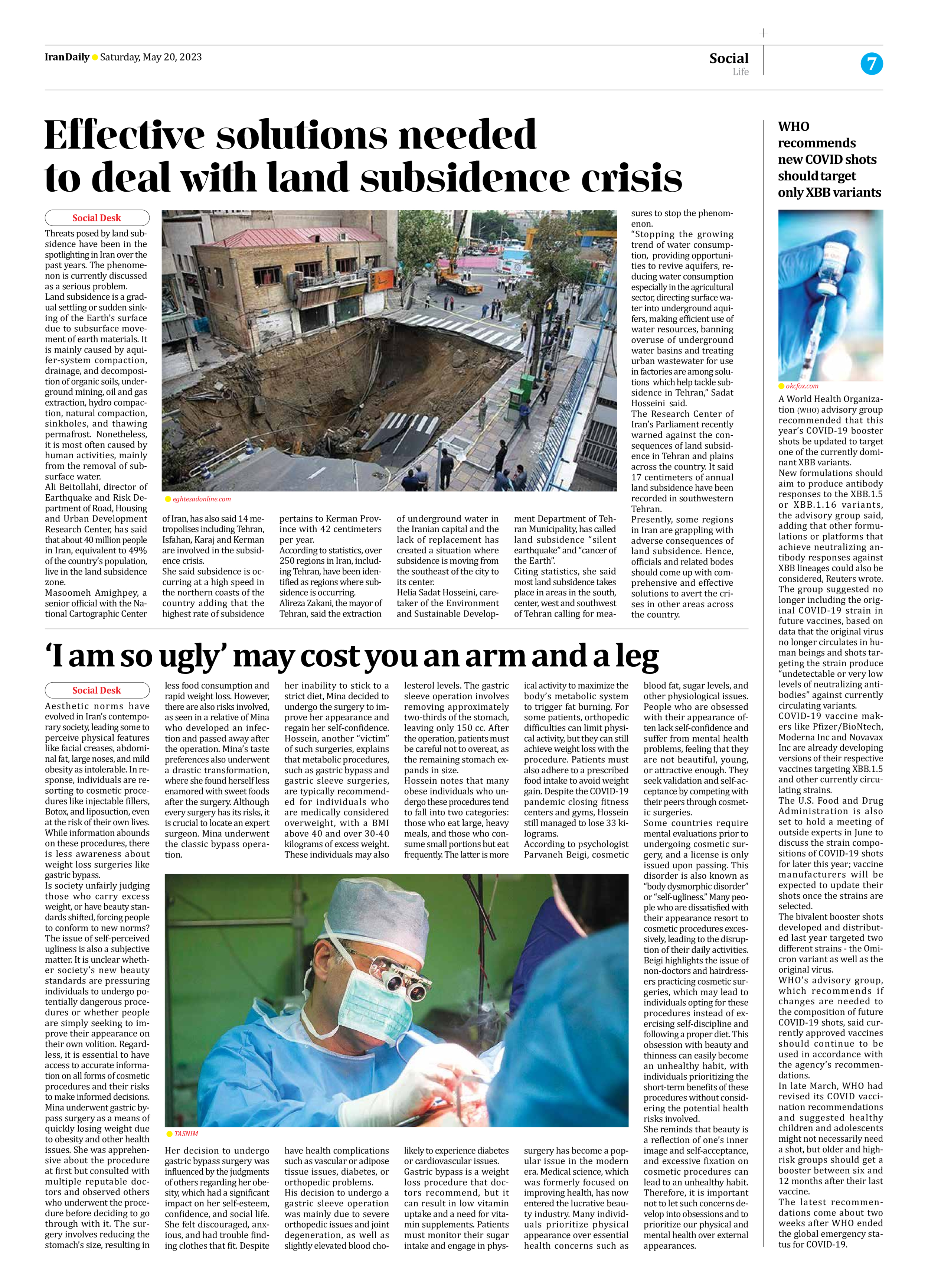
‘I am so ugly’ may cost you an arm and a leg
Aesthetic norms have evolved in Iran’s contemporary society, leading some to perceive physical features like facial creases, abdominal fat, large noses, and mild obesity as intolerable. In response, individuals are resorting to cosmetic procedures like injectable fillers, Botox, and liposuction, even at the risk of their own lives. While information abounds on these procedures, there is less awareness about weight loss surgeries like gastric bypass.
Is society unfairly judging those who carry excess weight, or have beauty standards shifted, forcing people to conform to new norms? The issue of self-perceived ugliness is also a subjective matter. It is unclear whether society’s new beauty standards are pressuring individuals to undergo potentially dangerous procedures or whether people are simply seeking to improve their appearance on their own volition. Regardless, it is essential to have access to accurate information on all forms of cosmetic procedures and their risks to make informed decisions.
Mina underwent gastric bypass surgery as a means of quickly losing weight due to obesity and other health issues. She was apprehensive about the procedure at first but consulted with multiple reputable doctors and observed others who underwent the procedure before deciding to go through with it. The surgery involves reducing the stomach’s size, resulting in less food consumption and rapid weight loss. However, there are also risks involved, as seen in a relative of Mina who developed an infection and passed away after the operation. Mina’s taste preferences also underwent a drastic transformation, where she found herself less enamored with sweet foods after the surgery. Although every surgery has its risks, it is crucial to locate an expert surgeon. Mina underwent the classic bypass operation.
Her decision to undergo gastric bypass surgery was influenced by the judgments of others regarding her obesity, which had a significant impact on her self-esteem, confidence, and social life. She felt discouraged, anxious, and had trouble finding clothes that fit. Despite her inability to stick to a strict diet, Mina decided to undergo the surgery to improve her appearance and regain her self-confidence.
Hossein, another “victim” of such surgeries, explains that metabolic procedures, such as gastric bypass and gastric sleeve surgeries, are typically recommended for individuals who are medically considered overweight, with a BMI above 40 and over 30-40 kilograms of excess weight. These individuals may also have health complications such as vascular or adipose tissue issues, diabetes, or orthopedic problems.
His decision to undergo a gastric sleeve operation was mainly due to severe orthopedic issues and joint degeneration, as well as slightly elevated blood cholesterol levels. The gastric sleeve operation involves removing approximately two-thirds of the stomach, leaving only 150 cc. After the operation, patients must be careful not to overeat, as the remaining stomach expands in size.
Hossein notes that many obese individuals who undergo these procedures tend to fall into two categories: those who eat large, heavy meals, and those who consume small portions but eat frequently. The latter is more likely to experience diabetes or cardiovascular issues.
Gastric bypass is a weight loss procedure that doctors recommend, but it can result in low vitamin uptake and a need for vitamin supplements. Patients must monitor their sugar intake and engage in physical activity to maximize the body’s metabolic system to trigger fat burning. For some patients, orthopedic difficulties can limit physical activity, but they can still achieve weight loss with the procedure. Patients must also adhere to a prescribed food intake to avoid weight gain. Despite the COVID-19 pandemic closing fitness centers and gyms, Hossein still managed to lose 33 kilograms.
According to psychologist Parvaneh Beigi, cosmetic surgery has become a popular issue in the modern era. Medical science, which was formerly focused on improving health, has now entered the lucrative beauty industry. Many individuals prioritize physical appearance over essential health concerns such as blood fat, sugar levels, and other physiological issues. People who are obsessed with their appearance often lack self-confidence and suffer from mental health problems, feeling that they are not beautiful, young, or attractive enough. They seek validation and self-acceptance by competing with their peers through cosmetic surgeries.
Some countries require mental evaluations prior to undergoing cosmetic surgery, and a license is only issued upon passing. This disorder is also known as “body dysmorphic disorder” or “self-ugliness.” Many people who are dissatisfied with their appearance resort to cosmetic procedures excessively, leading to the disruption of their daily activities.
Beigi highlights the issue of non-doctors and hairdressers practicing cosmetic surgeries, which may lead to individuals opting for these procedures instead of exercising self-discipline and following a proper diet. This obsession with beauty and thinness can easily become an unhealthy habit, with individuals prioritizing the short-term benefits of these procedures without considering the potential health risks involved.
She reminds that beauty is a reflection of one’s inner image and self-acceptance, and excessive fixation on cosmetic procedures can lead to an unhealthy habit. Therefore, it is important not to let such concerns develop into obsessions and to prioritize our physical and mental health over external appearances.







